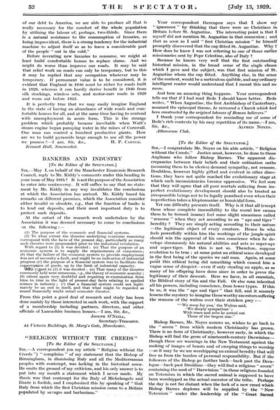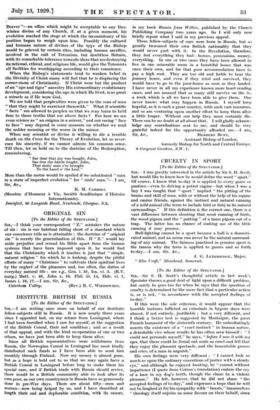[To the Editor of the SPECTATOR.] SIR, I congratulate Mr.
Noyes on his able article, " Religion without the Creeds." Justice must, however, be done to those Anglicans who follow Bishop Barnes. The apparent dis- crepancies between their beliefs and their ordination oaths (assuming them to be clerics) demand sympathy, not censure. Doubtless, however highly gifted and evolved in other direc- tions, they have not quite reached the evolutionary stage at which such inconsistencies become oppressive. We feel sure that they will agree that all poor mortals suffering from im- perfect evolutionary development should also be treated as irresponsible beings not to be legally penalised even when their imperfection takes a kleptomaniac or homicidal form.
Yet one difficulty presents itself. Why is it that all (except those whose complete insensibility to the moral law causes them to be termed insane) feel some slight uneasiness called " remorse " when they act according to an " ape and tiger " heredity ? They are simply acting according to their nature —the legitimate object of every creature. Hence he who feels powerfully within him the workings of the jungle-spirit should win the approval of his own conscience when he de- velops strenuously his natural abilities and acts as super-ape and super-tiger. But this is not so. Therefore, suppose evolution to be true ; at some point an ethical sense developed in the first being of the species we call man. Again, at some point this ethical being did something which caused him a vague sense of disquiet—even if only stealing an apple, as so many of his offspring have done since in order to prove the legitimacy of their descent. Here we have, in all essentials, the Biblical story of Sin and the Fall. Or else man inherited all his powers, including conscience, from lower types. If this be so, it was the " ape and tiger " that fell, and it scarcely lessens the mystery to imagine those worthy ancestors suffering the remorse of the walrus over their stricken prey :— "‘ We weep for you,' the Walrus said, 'We deeply sympathize' ; With tears and sobs he sorted out Those of the largest size."
Bishop Barnes, Mr. Noyes assures us, wishes to go back to the " acorn " from which modern Christianity has grown. There is no form of Christianity, however early, in which the Bishop will find the germ of nineteenth-century Darwinism— though there are warnings in the New Testament against the making of images of beasts and of creeping things to worship —so it may be we are worshipping an animal heredity that will free us from the burden of personal responsibility. But if the followers of the Bishop go further back—back past the Deca- logue—back past Druidism—they will find a religious " acorn" containing the seed of " Darwinism " in those religions founded on Totemism in which the sacred animal is supposed to have been worshipped as the actual ancestor of the tribe. Perhaps the day is not far distant when the lack of a new creed which Bishop • Barnes deplores will be supplied by the " New, Totemism " under the leadership of the " Great Sacred
Beaver "—an office which might be acceptable to any Dar- winian divine of any Church, if, at a given moment, his evolution reached the stage at which the inconsistency of his position began to weigh upon him. Possibly the cultured and humane nature of divines of the type of the Bishop would be grieved by certain rites, including human sacrifice, involved in the cult of Totemism, but doubtless Britain, with its remarkable tolerance towards ideas that are destroying its national, ethical, and religious life, would give the Totemists all facilities for worshipping according to their conscience.
When the Bishop's statements tend to weaken belief in the Divinity of Christ many will feel that he is displacing the corner-stone of Christianity. If Christ were but the product of an " ape and tiger" ancestry His extraordinary evolutionary development, considering the age in which He lived, is as great a miracle as if He were God.
We are told that perplexities were given to the sons of man " that they might be exercised therewith." What if scientific facts " are allowed to perplex us that we may learn to hold firm to those truths that are above facts ? For here we see even science as " an enigma in a mirror," and our seeing " face to face " may depend in some measure on whether we read the nobler meaning or the worse in the mirror.
When any scientist or divine is willing to die a terrible death on the Cross for the Theory of Evolution, let us rever- ence his sincerity, if we cannot admire his common sense.
Till then, let us hold on to the doctrine of the Redemption, remembering,
" Sae dear that joy was bought, John, Sae free the battle fought, John, That sinfu' man e'er brought To the Land o' the Leal."
More than the metre would be spoiled if we substituted " man in a state of imperfect evolution " for " sinfu' man."— I am, Sir, &c., K. M. CARROLL (Membre d'Honneur a Vie, Societe Academique d 'Histoire Internationale).
Innisfail, 46 Langside Road, Newlands, Glasgow, S.3.

































 Previous page
Previous page